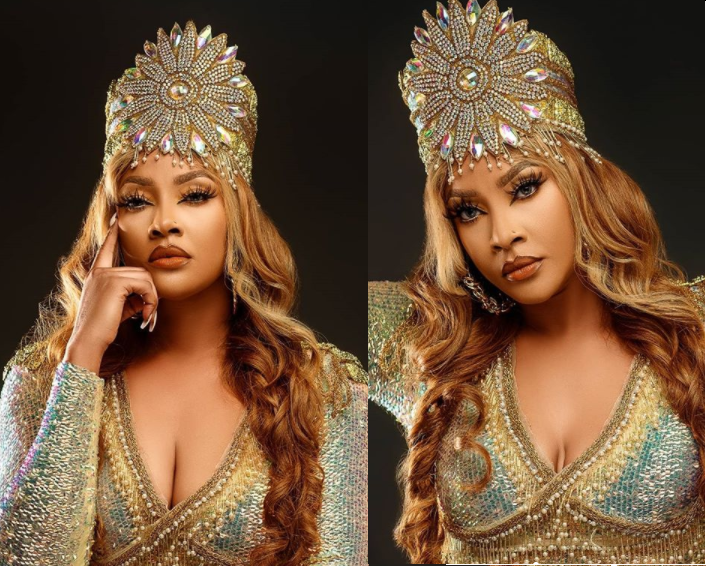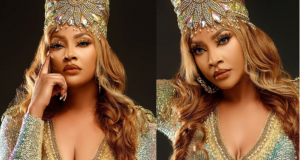
Angela Okorie
She recently had her say via her social media page, and fans have been reacting.
According to her, she needs her female colleagues to stop lying that they are making gigantic amounts of money from the movie industry, because it is just not true.
Angela added that majority of the actresses who build luxurious houses and claim its Nollywood money are only kidding themselves, because she knows what the industry pays.
His words, “You’ll see somebody that just entered Nollywood. you’re not even up to a year in Nollywood, you’ll come and lie for people and say you just bought a house. Please, you just bought a house, which money paid for your house. Which money did you use in buying the house?”
“And you’ll come and tell people that they are paying you. Oga, you no dey earn pass me. You no dey earn pass a lot of A-list artists that have been there for 20 years and working out their lives. You’re making them look like they’ve not been working. You’re making them look like what they’ve been doing, they’ve been playing.”
“You can’t come and tell me that it’s film money you used in buying the house because at the end of the day, you don’t even earn more than me and the last time I checked, you have not even done up to ten movies.”
“If there’s something else you are doing to make money, you can say it. But you can’t just come and say that film gave you this money. That’s a lie. It’s a huge lie.”
Nollywood is a sobriquet that originally referred to the Nigerian film industry. The origin of the term dates back to the early 2000s, traced to an article in The New York Times. Due to the history of evolving meanings and contexts, there is no clear or agreed-upon definition for the term, which has made it a subject to several controversies.
The origin of the term “Nollywood” remains unclear; Jonathan Haynes traced the earliest usage of the word to a 2002 article by Matt Steinglass in the New York Times, where it was used to describe Nigerian cinema.
Charles Igwe noted that Norimitsu Onishi also used the name in a September 2002 article he wrote for the New York Times. The term continues to be used in the media to refer to the Nigerian film industry, with its definition later assumed to be a portmanteau of the words “Nigeria” and “Hollywood”, the American major film hub.
Film-making in Nigeria is divided largely along regional, and marginally ethnic and religious lines. Thus, there are distinct film industries – each seeking to portray the concern of the particular section and ethnicity it represents. However, there is the English-language film industry which is a melting pot for filmmaking and filmmakers from most of the regional industries.
![DJ Baddo – All Of Me Remix ft John Legend [AuDio]](https://www.naijavibe.net/wp-content/uploads/wordpress-popular-posts/94409-featured-40x40.jpg) DJ Baddo – All Of Me Remix ft John Legend [AuDio]
DJ Baddo – All Of Me Remix ft John Legend [AuDio]  Dj Kamol – Crazy Gyration ft Skailey Normal [AuDio]
Dj Kamol – Crazy Gyration ft Skailey Normal [AuDio] ![Mr. Charis - All Back ft Zouwrah [AuDio]](https://www.naijavibe.net/wp-content/uploads/wordpress-popular-posts/67331-featured-40x40.jpg) Mr. Charis – All Back ft Zouwrah [AuDio]
Mr. Charis – All Back ft Zouwrah [AuDio] ![DJ Enimoney - Shaku Shaku Therapy [MixTape]](https://www.naijavibe.net/wp-content/uploads/wordpress-popular-posts/155494-featured-40x40.jpg) DJ Enimoney – Shaku Shaku Therapy [MixTape]
DJ Enimoney – Shaku Shaku Therapy [MixTape] ![Yung6ix – I Pray ft Oritse Femi [AuDio]](https://www.naijavibe.net/wp-content/uploads/wordpress-popular-posts/163012-featured-40x40.jpeg) Yung6ix – I Pray ft Oritse Femi [AuDio]
Yung6ix – I Pray ft Oritse Femi [AuDio] ![Iyanya – Credit ft Don Jazzy [AuDio]](https://www.naijavibe.net/wp-content/uploads/wordpress-popular-posts/167713-featured-40x40.jpg) Iyanya – Credit ft Don Jazzy [AuDio]
Iyanya – Credit ft Don Jazzy [AuDio] ![Kolasoul - All Of Me [AuDio]](https://www.naijavibe.net/wp-content/uploads/wordpress-popular-posts/40876-featured-40x40.jpg) Kolasoul – All Of Me [AuDio]
Kolasoul – All Of Me [AuDio] ![Big C - Obimo ft Starface [AuDio]](https://www.naijavibe.net/wp-content/uploads/wordpress-popular-posts/19188-featured-40x40.jpeg) Big C – Obimo ft Starface [AuDio]
Big C – Obimo ft Starface [AuDio]  Victony, Don Toliver & Rema – Soweto
Victony, Don Toliver & Rema – Soweto  NaijaVibe at 10 MixTape
NaijaVibe at 10 MixTape  Tekno – Freetown
Tekno – Freetown  Libianca – People Remix ft Ayra Starr & Omah Lay
Libianca – People Remix ft Ayra Starr & Omah Lay
 NaijaVibe NaijaVibe | Download Latest Nigerian Music & Mp3s
NaijaVibe NaijaVibe | Download Latest Nigerian Music & Mp3s




